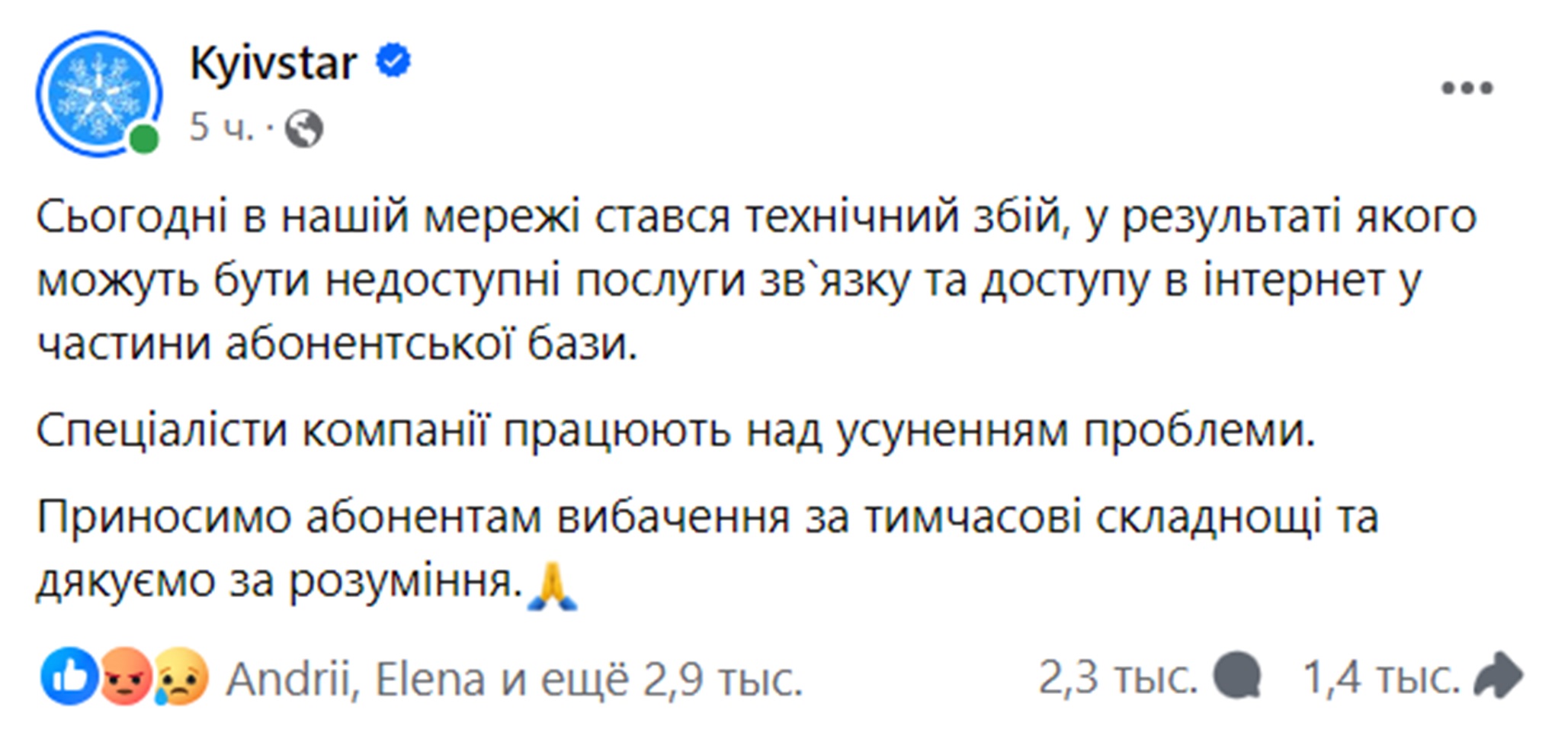

Проводятся серьезные обсуждения о возможной государственной национализации компании «Киевстар».
Утром 12 декабря миллионы украинцев столкнулись с неприятным сюрпризом — по всей стране перестали работать сервисы крупнейшего мобильного оператора «Киевстар». «Умер» даже сайт компании. В нынешнем технологическом мире в таких случаях речь идет не только о невозможности совершить звонки, посидеть в интернете со смартфона или воспользоваться услугами домашнего интернета. Вместе со всем этим «легли» все девайсы, которые завязаны на SIM-карты и GSM-модемы от «Киевстара», — банкоматы, платежные терминалы, сигнализации… Часть бизнеса, которая не имела запасных вариантов, просто вынуждена была частично остановить работу. А во Львове, Ивано-Франковске, Днепре и других городах проблемы со связью даже помешали вовремя выключить уличные фонари. Более того — в Сумской области из-за сбоя в работе мобильного оператора временно прекратила работать система оповещения. Некоторые «телеграмм»-каналы сообщили, что такая система также прекратила работать в Днепре и Киевской области.
«Киевстар» на своей странице в «фейсбуке» (один из немногих официальных каналов коммуникации, оставшихся у оператора) уже в 8.10 признал технические проблемы, но из сообщения не было понятно, что произошло что-то слишком экстраординарное.


Но чем дальше — тем очевиднее становилось, что ситуация незаурядная. Особенно это ощутили на себе жители западных областей, где «Киевстар» исторически превалировал по количеству абонентов. Пользователи «Киевстара» столкнулись даже с проблемой переключиться на сети других операторов с использованием услуги национального роуминга, которая была введена с началом масштабной войны.
Тем временем начали распространяться слухи, что проблемы с сетью связаны то ли с обысками в компании, то ли с хакерской атакой. Впоследствии официально «Киевстаром» была подтверждена вторая версия: оператор успокоил, что несмотря на атаку на ядро сети удалось предотвратить утечку личных данных абонентов и пообещал всем пострадавшим компенсацию за нервный день.
На «краш» «Киевстара» вынуждены были реагировать в правительстве. Минцифры засвидетельствовало, что последствия атаки настолько значительны, что «киевстаровских» абонентов даже не видят сети других операторов, и сообщили, что после решения текущей проблемы планируется обсуждение со всеми мобильными операторами, как можно уберечься от аналогичных ситуаций в дальнейшем. Вице-премьер-министр Александр Кубраков еще в первой половине дня дал понять, что восстановления связи нужно подождать минимум в течение четырех-пяти часов. Впрочем гендиректор «Киевстара» Александр Комаров впоследствии сделал пессимистическое заявление: сроки восстановления сервисов окончательно не понятны, вспомнив о войне с РФ, которая имеет свое измерение и в киберпространстве.
«Мы не могли противодействовать атаке на виртуальном уровне, поэтому отключали «Киевстар» физически, чтобы ограничить доступ врага к инфраструктуре. Поэтому нам нужно действовать на физическом уровне, подключаясь, условно, через патч-корды к каждому элементу сети для того, чтобы понять уровень разрушения сети на текущее время», — пояснил Комаров. Поняв, что у их оператора проблемы надолго, абоненты «Киевстара» начали сметать с полок стартовые пакеты Vodafone и Lifecell, из-за чего у этих операторов существенно возросла нагрузка на сети.
Также впоследствии стало известно, что «Киевстар» — наиболее пострадавший, но он — не единственная цель сегодняшней хакерской атаки. От онлайн-террористов также пострадал monobank, о чем сообщил СЕО проекта Олег Гороховский. Но он заверил, что ситуация находится под контролем.
И снова российский след
Атака на крупнейшего мобильного оператора Украины, приведшая к панике и параличу многих процессов в стране во время войны, не могла не вызвать ряд вопросов относительно национальной безопасности. Претензий, собственно, к самому «Киевстару» хватает давно — прежде всего из-за его подконтрольности структурам российского олигарха Михаила Фридмана. Доля акций Фридмана в «Киевстаре» (а также в мобильном операторе Lifecell) была арестована украинским судом лишь в октябре.
В сентябре 2023 года Служба безопасности Украины заочно сообщила о подозрении подсанкционному российскому олигарху Михаилу Фридману по статье «Финансирование действий, совершенных с целью насильственного изменения или свержения конституционного строя или захвата государственной власти, изменения границ территории или государственной границы Украины» (часть 3 статьи 110-2 Уголовного кодекса Украины).
В компании систематически уверяют, что Фридман никоим образом не влияет на деятельность компании и не получает от ее деятельности никакой финансовой или иной выгоды. Но информационные волны о возможной конфискации доли Фридмана в пользу государства регулярно поднимаются. По крайней мере, другие крупные активы олигарха — «Альфа-банк» и завод минеральных вод «Оскар» (ТМ «Моршинская») уже перешли в руки государства. С «Киевстаром» ситуация сложнее: ее топ-менеджмент в лице гендиректора Александра Комарова предостерегал от того, чтобы делать резкие движения, и подчеркивал, что львиная доля акций компаний свободно продается на биржах NASDAQ и Euronext, а более четверти акционеров компании являются гражданами Соединенных Штатов. Именно попыткой защитить «Киевстар» от национализации и ходом для защиты актива объясняли сенсационное вхождение в Совет директоров компании месяц назад экс-госсекретаря США и бывшего главы ЦРУ Майка Помпео.
После начала широкомасштабной агрессии российские акционеры старательно вычищают упоминания о себе из публичной документации «Киевстара», ведь это так раздражает украинцев.
По сведениям Агентства по развитию инфраструктуры фондового рынка Украины (SMIDA), 19 июля 2022 года произошла замена двух членов Наблюдательного совета ЧАО «Киевстар». Вместо Алекса Болиса зашел Геннадий Газин (до этого работал в материнской компании VEON, которая и владеет «Киевстаром». Кроме этого, в 2012-2019 годах Газин занимал должность члена Инвестиционного комитета Russian-Kazakhstan Nanotechnology Fund (Россия).
Veon — международная телекоммуникационная группа компаний со штаб-квартирой в Нидерландах. Является единственным акционером ЧАО «Киевстар». В октябре Veon закрыл сделку по продаже российского «Вымпелкома» (ТМ «Билайн») и формально вышел с российского рынка.
Структура акционеров Veon:
Letterone Investment Holdings S.A. — 47,9% (Фридман владеет менее 50% Letterone, но является крупнейшим акционером компании)
The Stichting — 8,3%
Lingotto Investment Management LLP — 7,6%
Shah Capital Management Inc. — 6,7%.
На место другого члена набсовета Даниила Пасько (экс-советник президента Петра Порошенко) зашел Лох Бин Абдулла Мохд Хаирил Кевин, занимавший высокие должности в фирмах телекоммуникационной сферы в странах Азии.
Очевидно, что исключение Алекса Болиса из набсовета носило политический характер. Ведь, по данным ресурса «Война и санкции», который модерирует Национальное агентство по вопросам предотвращения коррупции, Болис входит в Совет директоров российского ПАО «Вымпел-Коммуникации» (контролировался VEON). А руководитель этой компании «обеспечивает высокую доходную часть бюджета РФ и значительный источник доходов правительства РФ, чем поддерживает действия, направленные на насильственное изменение, свержение конституционного строя, захват государственной власти, изменение границ территории или государственной границы Украины, посягательство на территориальную целостность и неприкосновенность Украины», сказано в информации вышеназванного ресурса.
5 августа 2022 года произошла смена в руководстве Наблюдательного совета ЧАО «Киевстар». Полномочия председателя Совета сложил Терзиоглу Мухтерем Каан. Его место занял Геннадий Газин, который в середине июля 2022-го был избран членом наблюдательного совета.
В конце 2022 года еще один член Наблюдательного совета «Киевстара» с потенциальным «российским следом» потерял должность. Это Майкл Шульц, который, по информации ресурса «Война и санкции», является членом Совета директоров российского ПАО «Вымпел-Коммуникации».
Место Шульца в Наблюдательном совете «Киевстара» получила Линехен Карен Мари, которая работала в различных европейских и американских компаниях.
В 2023 году ротации в наблюдательном совете продолжились. Что примечательно: 28 апреля решением общего собрания акционеров ЧАО «Киевстар» был переизбран член наблюдательного совета Андрей Коболев, бывший руководитель «Нафтогаза», а ныне обвиняемый в злоупотреблении служебным положением. На этой должности Коболев должен был еще работать три года.
Однако 15 мая его полномочия внезапно были прекращены. Вместо Коболева назначен финдиректор материнской компании Veon Юп Бракенхофф.
И уже 1 декабря 2023 года полномочия председателя Наблюдательного совета «Киевстар» потерял Геннадий Газин. Хотя он должен был руководить до апреля 2026 года. К рулю Совета вернули Терзиоглу Мухтерем Каан. Кстати, в биографии этого господина есть интересный факт: с марта 2020 года по август 2023 года занимал должность члена и председателя Совета директоров Public Joint Stock Company Vimpel-Communications (Россия). Той самой, где членами совета директоров являются Алекс Болис и Майкл Шульц.
И «вишенка» на торте: по сведениям ресурса «Война и санкции», в июле 2023 года Канада наложила санкции на российскую ПАО «Вымпел-Коммуникации».
В поисках государственной измены
Служба безопасности уже открыла уголовное производство по факту кибератаки на «Киевстар». Причем сразу по восьми статьям:
ст. 361 («несанкционированное вмешательство в работу информационных (автоматизированных), электронных коммуникационных, информационно-коммуникационных систем, электронных коммуникационных сетей»,
ст. 361-1 (создание с целью противоправного использования, распространения или сбыта вредных программных или технических средств, а также их распространение или сбыт),
ст. 110 («посягательство на территориальную целостность и неприкосновенность Украины»),
ст. 111 («государственная измена»),
ст. 113 («диверсия»),
ст. 437 («планирование, подготовка, развязывание и ведение агрессивной войны»),
ст. 438 («нарушение законов и обычаев войны»),
ст. 255 («создание, руководство преступным сообществом или преступной организацией, а также участие в ней»).
Как видим, «букет» очень разнообразен. Помогал ли хакерам кто-то из местных специалистов, очень хорошо знакомых с защищенной ИТ-архитектурой компании, должно установить следствие.
Версий сегодняшнего коллапса «Киевстара» хватает — вплоть до очень конспирологических. Удар по украинскому телеком-гиганту совпал по времени с отчетом Главного управления разведки Минобороны по уничтожению базы данных налоговой системы России. По результатам операции была парализована связь между центральным офисом в Москве и 2300 российскими территориальными управлениями. Последствия атаки, по сообщению ГУР, россияне пытаются безрезультатно ликвидировать уже четвертый день подряд. Поэтому попытка уничтожить инфраструктуру «Киевстара» выглядит как ответный удар, хотя, похоже, такое мощное нападение готовилось независимо от успехов украинских хакеров. А его успешность поощрит россиян к дальнейшим попыткам парализовать украинские коммуникационные и финансовые системы.
Нельзя исключать, что здесь интересы Кремля совпали с интересами Фридмана, который после начала войны открещивался из-за границы от своей поддержки путинского режима, но все-таки недавно вернулся в Москву. Российский олигарх таким образом может дать понять, что без его участия золотая карета «Киевстара» может в любой момент превратиться в тыкву.
Но обсуждается и, скажем так, внутренняя конспирологическая версия сегодняшних событий. «Киевстар» уже давно является целью для национализации или конфискации в пользу государства. СМИ сообщали, что Минюст уже был готов подать исковое заявление в Высший антикоррупционный суд с целью взыскать «Киевстар» в доход государства, но это непростое решение забуксовало в СНБО. Замглавы Офиса президента Ростислав Шурма, комментируя дальнейшую судьбу «Киевстара» месяц назад, прямо говорил, что юристы внимательно изучают правовую ситуацию, и оценивал как высокую вероятность принятия санкций с последующей конфискацией этой компании.
Так что сегодняшняя история, которая существенно испортила настроение и планы миллионам украинцев, может получить политическое продолжение…
Recent Posts
Сбежавший в Швейцарию блогер Станислав Домбровский просит прощения у украинцев
Одесский трэш блогер Стас Домбровский, который в последнее время проживает в Швейцарии, записал видеообращение к…
Александра Устинова и атака на руководство АОЗ: что стоит за волной критики
Александра Устинова, народная депутат, которая в последние дни активно атакует Агентство оборонных закупок (АОЗ) возможно…
Журналисты показали имение киевской судьи, закрывшей дело Приходько
Свобода "под ключ" или манипуляция правосудием? Борис Приходько – нацбанкир времен Януковича и действующий нардеп…
Судьи вне закона
В течение последних трех лет внимание общественности если и бывает приковано к судам, то гораздо…
Артем Ляшанов и bill_line спасают репутацию через суд
Финтех-компания столкнулась с обвинениями в отмывании денег игорной мафии. ООО «Тех-Софт Атлас» (ТМ «bill_line») и…
Криптобиржа WhiteBIT: как Владимир Носов и «регионалы» Шенцевы отмывают деньги и помогают спецслужбам России
Владимир Носов в Украине пытается позиционировать себя как респектабельный бизнесмен и хозяин криптобиржи WhiteBIT. Однако…


